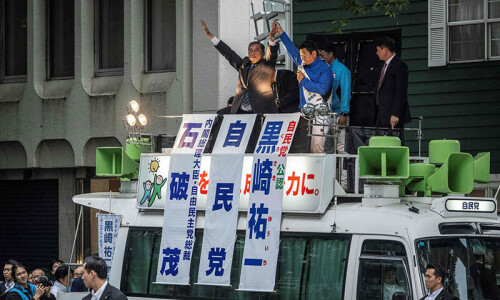TOKYO: On Saturday, candidates in Japan’s extremely close election made last-minute appeals to voters, as opinion polls suggested that the ruling coalition might not win a majority.
The Liberal Democratic Party (LDP) would suffer its worst result since 2009 and Prime Minister Shigeru Ishiba would likely suffer a devastating blow in the event of such a shocking outcome in Sunday’s election.
Ishiba, who has been a fan of trains, pop idols from the 1970s, and building model ships and planes, just took over as leader of the LDP, which has been in charge of Japan for nearly seven decades.
On October 1, the 67-year-old former defense minister won a fierce internal race to become premier. He called the emergency parliamentary elections a few days later, promising a “new Japan.”
Through family-friendly policies like flexible working hours, Ishiba promised to revitalize depressed rural areas and address the “quiet emergency” of Japan’s declining population. However, he has since changed his mind on a number of issues, including allowing married couples to use different surnames.
Voters are outraged by rising prices, and Ishiba is also plagued by the repercussions of a party slush fund scandal that contributed to Fumio Kishida’s downfall.
According to a survey conducted by the Yomiuri Shimbun newspaper, the LDP and its coalition partner Komeito may have difficulty securing the 233 seats needed for a majority in the lower house.
Ishiba has established this threshold as his goal; failing to meet it would jeopardize his standing within the LDP, necessitate the search for additional coalition partners, and lead a minority government.
“Start afresh” The local media speculated that Ishiba might even resign immediately to assume responsibility, making him the shortest-serving prime minister in Japan’s postwar history.
The ongoing record is held by Naruhiko Higashikuni who served for 54 days — four days more than English pioneer Liz Support in 2022 — soon after Japan’s 1945 loss in The Second Great War.
Ishiba reportedly said on Friday, “The situation is extremely severe,” but on Saturday, at a rally, he made a new promise of renewal to hundreds of supporters. He stated, “We want to start over as a sincere, just, and fair party and seek your mandate.”
The Constitutional Democratic Party (CDP), led by popular former prime minister Yoshihiko Noda, is the second-biggest party in parliament. In many districts, LDP candidates face off against those from the CDP.
Noda stated at a rally, “The LDP’s politics is all about quickly implementing policies for those who give them a lot of cash.” However, “those in vulnerable positions who cannot offer cash have been ignored,” he continued, claiming that the LDP-led government had provided insufficient assistance to earthquake survivors in central Japan.



